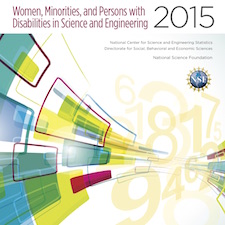 A new report from the National Science Foundation offers a wealth of statistics on Blacks and other minorities in science and engineering disciplines. Here we take a look at the Black enrollments in graduate school by scientific discipline.
A new report from the National Science Foundation offers a wealth of statistics on Blacks and other minorities in science and engineering disciplines. Here we take a look at the Black enrollments in graduate school by scientific discipline.
In 2012, there were 561,418 students enrolled in science and engineering graduate programs in the United States. Of these, 31,338, or 5.6 percent were Black. However, the National Science Foundation includes graduate students in psychology and the social sciences in this data. Blacks were 10.2 percent of all the graduate students in psychology and 10.4 percent of all graduate students in the social sciences. More than half of all Black graduate students counted by the National Science Foundation in the sciences and engineering were enrolled in either psychology or the social sciences.
However, in many other science-related fields, Blacks were a small percentage of the overall graduate student population. For example, Blacks were 4.2 percent of all graduate students in computer science, 2.5 percent in the physical sciences, 3.1 percent in mathematics, 4.8 percent in the biological sciences, and 2.6 percent in engineering fields.
There were only eight Black students nationwide enrolled in graduate programs in astronomy, about 0.6 percent of total enrollments in the field.
The full 349-page report, Women, Minorities, and Persons With Disabilities in Science and Engineering: 2015,” may be downloaded by clicking here.











The African-American numbers are dismal at best. But, the data is not surprising at all when you look at the poor quality of education our students are receiving in K-12 public schools. I teach engineering at the university level and I see very few African-American students interested in engineering.
Without a quality math foundation students will not be success in calculus technical fields. The unfortunate thing is most Americans are afraid of math. So with that said the numbers will remain dismal until we attack the primary problem.